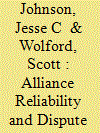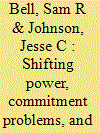|
|
|
Sort Order |
|
|
|
Items / Page
|
|
|
|
|
|
|
| Srl | Item |
| 1 |
ID:
189959


|
|
|
|
|
| Summary/Abstract |
States form defensive alliances hoping to deter adversaries and avoid war. However, scholars and policy analysts often worry that if an alliance fails to deter the promise of military support will encourage escalation, pushing disputants closer to war. We show that in many cases this concern is unwarranted. We use a game-theoretic model of alliance reliability and crisis bargaining to show that the same factors that indicate unreliability and provoke disputes also encourage alliance members to make concessions rather than risk war. We test this hypothesis using a sample of militarized disputes initiated against members of defensive alliances, where recent shifts in military capabilities represent changes in challengers’ estimates of alliance reliability. Less-reliable alliances are less likely than reliable allies to deter disputes, but they also decrease the probability of escalation relative to reliable alliances. Unreliable alliances need not encourage war; rather, they can discourage it.
|
|
|
|
|
|
|
|
|
|
|
|
|
|
|
|
| 2 |
ID:
141233


|
|
|
|
|
| Summary/Abstract |
It is well recognized that military alliances can provide their members with important security benefits. However, less attention has been paid to the policy concessions states must grant others to enter into military alliances. To study this aspect of alliances, I develop a three-actor bargaining model of alliance formation that endogenizes both external threat and policy concessions. Specifically, a target state bargains with a potential defender over the concessions it must make to ally and then responds to a potential challenger. The model suggests that what is important for policy concessions in alliances is not just the power of the threatened state but its power relative to its challenger and how an alliance will change the distribution of power. I test implications of this model using data on promised policy concessions formalized in alliance treaties and find strong support for the hypotheses. More specifically, I find that states are willing to make more concessions in exchange for an alliance when they are unlikely to defeat their challengers alone and when their allies have a large effect on their probability of winning in war. These findings refine existing theories of alliances and offer the first large-N analysis of policy concessions in alliances.
|
|
|
|
|
|
|
|
|
|
|
|
|
|
|
|
| 3 |
ID:
103533


|
|
|
|
|
| Publication |
2011.
|
| Summary/Abstract |
Do military alliances lead to peace or to war? Research has suggested that defensive alliances to potential targets deter dispute initiation (Leeds 2003b:427). This would seem to suggest that forming defensive alliances is a good policy prescription for those seeking to encourage peace. Yet, some argue that even if defense pacts have a deterrence effect, defense pacts may also have other effects that increase militarized conflict in the international system. Specifically, defense pacts may encourage member states to initiate and/or escalate disputes. In an analysis covering the period from 1816 to 2000, we evaluate these three potential effects of defense pacts-deterrence, initiation, and escalation. We find support for the hypothesis that defensive alliances deter the initiation of disputes but no evidence in support of the claims that states with defensive allies are more likely to initiate disputes in the international system or that targets with allies are more likely to respond to dispute initiation with further militarization. We conclude that defensive alliances lower the probability of international conflict and are thus a good policy option for states seeking to maintain peace in the world.
|
|
|
|
|
|
|
|
|
|
|
|
|
|
|
|
| 4 |
ID:
120880


|
|
|
|
|
| Publication |
2013.
|
| Summary/Abstract |
Recent research has shown that the General Agreement on Tariffs and Trade (GATT)/World Trade Organization (WTO), contrary to common perceptions, does not increase trade. We argue that the effect of the GATT/WTO on dyadic trade flows is conditioned by the strength of market-protecting institutions (MPIs), which are the fundamental determinant of transaction costs. Dyads with weak MPIs do not see an increase in trade from GATT/WTO membership while dyads that have strong MPIs do see an increase in trade from GATT/WTO membership. In the former case, the benefits of GATT/WTO membership are outweighed by the high risk of doing business under weak market protection, but when property rights are well protected, GATT/WTO membership contributes positively to international trade. Empirical analysis of bilateral trade flows from 1948 to 1999 supports this hypothesis.
|
|
|
|
|
|
|
|
|
|
|
|
|
|
|
|
| 5 |
ID:
138304


|
|
|
|
|
| Summary/Abstract |
Many scholars argue that leaders' expectations about future shifts in the distribution of power can result in preventive war. If a leader expects her adversary to be significantly stronger in the future, the leader may choose to go to war with that adversary rather than bargain with a stronger adversary in the future. However, quantitative evaluations of this argument prove difficult, as they require a measure of leaders' expectations about future shifts in power rather than simply a measure of observed power. In this paper, we develop an empirical model of future power to create this measure. We then use that measure to evaluate the preventive war hypothesis. Our results support the preventive war hypothesis. Increases in a state's expected future probability of winning in war increase its probability of another state in a dyadic relationship initiating war against it.
|
|
|
|
|
|
|
|
|
|
|
|
|
|
|
|
| 6 |
ID:
134977


|
|
|
|
|
| Summary/Abstract |
Creating institutions that effectively manage interstate conflict is a priority for policy-makers. In this article we demonstrate that military allies are well positioned to influence the crisis-bargaining behavior of both challengers and targets in ways that often lead to peace. Through a three-player game-theoretic model, we demonstrate that a target's alliances not only have an effect on the demand that the challenger makes, but also on the behavior of the target. When a target values an alliance highly, an ally's recommendation for settlement can encourage the target to concede to demands without further escalation. Our statistical analysis provides evidence in support of the theoretical finding. Allies can both deter challengers and restrain partners, and as a result, can encourage peaceful behavior not only from adversaries, but from member states as well. Our study thus sheds new light on the role of military alliances as potential conflict management devices.
|
|
|
|
|
|
|
|
|
|
|
|
|
|
|
|
|
|
|
|
|